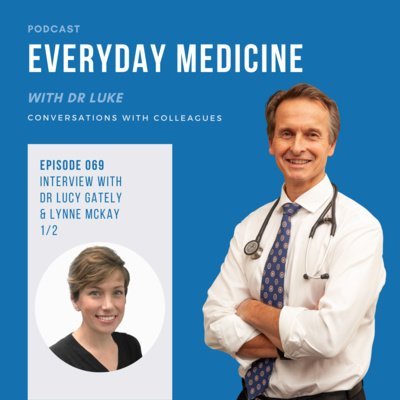Everyday Medicine by Dr Luke Crantock
Conversations with colleagues providing helpful ideas and advice in healthcare
Episode 85. Pancreatic Cancer with Dr Michael Lee
Pancreatic cancer is the eighth most common cancer reported in Australia. In 2021, it is estimated that there will be 4261 new cases and 3391 deaths. The incidence has increased from 10 per 100,000 in 1982 -to 12 per 100,000 today with the average age of onset between 60 and 65 years. At the time of diagnosis, approximately one-third of patients already have advanced disease with a limited 3 to 4-month survival prognosis, overall, 1-year survival for pancreatic cancer is only 16% and 5-year survival of 3% despite new approaches to management.
Episode 76. Breast Cancer with Dr Corinne Ooi
Breast cancer affects 1 in 7 women and remains the most diagnosed cancer in Australia with 57 new cases diagnosed each day, 1000 new cases per year and tragically 2000 deaths annually. Men are not excluded, for every 100 breast cancers one is diagnosed in a male. Genetic links for breast cancer such as the BRCA 1 and 2 genes receive significant attention but account for only 5% of total cases,75% of patients have no family history and additionally 75% of breast cancers are diagnosed in patients 50 years or older. Multiple risk factors including family history, young age of menarche and older age of menopause are frequently cited but less well known is the association with obesity which is responsible for up to 8% of all breast cancers. It is estimated that 1: in 4 cases of all breast cancer may be prevented with attention to known modifiable risk factors. Breastfeeding and earlier age of pregnancy are both protective factors.
Episode 70. Familial Cancer Screen with Dr Lucy Gately - Part 2
Genetic testing for cancer is important for a small number of families at increased risk due to the inheritance of genetic mutations. Most commonly this involves the inheritance of breast cancer genes such as the BRCA 1 and 2 or colorectal cancer genes such as the Lynch syndrome genes. Although these only represent a small percentage of total cancers reported there is significant public interest in these syndromes.
Episode 69. Familial Cancer Screening with Dr Lucy Gately and Lynne McKay - Part 1
In the context of family cancer screening, genetic testing looks for specific inherited changes or variants in a person’s genes which may predispose them to an increased risk of developing a neoplasm. Harmful variants in some genes are known to be associated with an increased risk of developing specific cancers such as mutations to the BRCA 1 and 2 genes associated with breast and ovarian cancer and the Lynch genes associated with colorectal and endometrial cancer.




